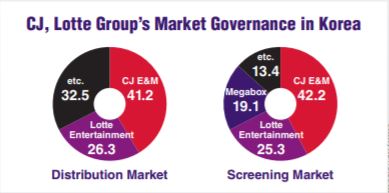Marvel Studios’ The Avengers: End Game has recorded over 13 million views and become the most viewed foreign film in Korea. There were, however, critical voices attributing its’ success to the screen monopoly. As a result, interest in the “screen cap” has been increased, and heated debate is underway on whether to approve or reject it. The screen cap, first proposed in 2016, refers to a measure that limits the number of screens that a cinema assigns to a particular film by law, in order to prevent a certain film from monopolizing screens as it is now. In response, the SungKyun Times (SKT) will analyze the pros and cons of the screen cap and suggests directions to which the domestic film industry should move toward.
Cinema Screen Monopoly
What Is Screen Monopoly?
Screen monopoly refers to the phenomenon in which a few films occupy 50% to 70% of screens in a cinema. When screen monopoly occurs, screens are allocated to only a small number of films that guarantee the profit. There are, however, some differences regarding the principal agent of monopoly, between past and present times. In the past, the main agents of the monopoly were large-scale Hollywood film studios, because in the 1960s to 1970s, the film industry in Korea was smaller than that of Hollywood. Therefore, the main concern was the Hollywood films’ dominance of the Korean film industry. As the film industry in Korea grew the large-scale domestic film studios began to monopolize the industry. In turn, this led to the threat toward the independent and art film studios. In addition, vertical systematization has worsened the problem. Vertical systematization indicates that certain major companies take the most processes in the film industry. In the Korean film industry, most films are made, distributed, and shown by a few major conglomerate companies. For example, companies such as CJ and Lotte group own and operate the major production and distributing agencies CJ Entertainment and Lotte Entertainment, respectively. These companies show films they produced for their multiplex theaters, such as CGV and Lotte Cinema. That is, by allowing particular films to take up the majority of screens in their cinema, screen monopoly is worsening. The Battleship Island, produced and distributed by CJ group, monopolizing more than 2,000 screens among the total of 2,700 screens in Korea is a typical example of this problem.

Discussion of Adopting Screen Cap
The screen cap regulates the proportion of the screens for certain films. Since such policy exists only in Korea, reporters created the term “screen cap”. Before screen cap was used, screen quota existed in Korea in order to protect the domestic film industry against Hollywood films. This system forces the cinemas to show domestic films for a certain number of days. As the film industry in Korea developed, Korean blockbusters became the principal agent of monopoly as well as Hollywood films. In this context, the debate about adopting the screen cap emerged. In 2016, the bill that institutionalized the screen cap system came up, and now four bills are pending in the National Assembly. Among them, the Promotion of the Motion Pictures and Video Products Act was revised last April. The act suggests that in a multiplex cinema, the single film cannot occupy more than 50% of screens during prime time, from 1 pm to 11 pm. Park Yang-woo, the Minister of Culture, Sports and Tourism (MCST) stated the need for the introduction for the screen cap, saying the need to specify the periods of screening limit.
Debate on Screen Caps
Pros of Screen Caps
➊ Fostering Small-scale Films
Limited opportunity for screenings due to screen monopoly hinders the development of small-scale films like independent and art films. According to the Twinkle of Independent Films, an exhibition which showed independent films in 4 independent cinemas in 2019 May, only less than five independent films recorded over two thousand views in Korea. More than 1,200 independent films are made each year, but less than 10% of them could be shown in the cinemas. Despite their originality, socially meaningful subjects, and touching contents, a lot of small-scale films could not be shown in cinemas because of the commercially driven film industry in Korea. Hence, by adopting screen caps, a monopoly by a few film companies could be prevented. As a result, it could expand the opportunity not only for small-scale films, but also for audiences, in that they can choose to watch a greater variety of films.
➋ Guaranteeing Equal Market Opportunity
According to the principle of economic democracy, a screen cap is essential to guarantee equal market opportunity in the film industry. Economic democratization is referred to in Article 119 of the Korean Constitution, indicating the regulation by the government in order to prevent domination and abuse of the economic power by certain parties. That is, it would be necessary for the government to prevent major companies from dominating the market by using their huge capital. Hence, multiplex cinemas and distributing companies made an agreement on the mutual growth of blockbuster and small-scale films in Korea in 2012, to make an equal competitive industry. They promised to assign the number of screens rationally considering the expected audiences and marketing factors, but they did not keep the agreement well because it was not compulsory. Therefore, by adopting a screen cap which is more regulative, the film industry would be more likely to suit the economic principle indicated in the constitution.
The Cons of Screen Caps
➊ Excessive Market Intervention
From an economic point of view, the cinema is likely to suffer losses due to reduced audiences and screen caps may be considered excessive market intervention. Films other than box-office hits are in relatively low demand, causing cinemas to lose money due to over-supply deficits. Since films are relatively less supplied than other commodities, cinemas depend on sales profits from hit films during certain periods, such as weekends, holidays, and the end of the year. Screen caps will be implemented to fill cinemas with other less popular films, which account for a large portion of cinema sales, and thus reduce cinema sales. Accordingly, cinemas will be expected to try to cover such losses by increasing the prices of tickets, which will cause more complaints from audiences who already have a lot of complaints about the expensive ticket prices.
➋ Violation of the Audience’s Right to Watch Hits
The most dominant public opinion on the controversy over the topic is that not being able to see much-wanted box-office hits because of a screen cap is unreasonable. Under the screen cap, in fact, for the films that many people want to see, the supply will be far short of the audience’s demand, thus infringing on the audience’s right to see a movie. When implementing the revision to the Act on the Promotion the Motion Pictures and Video Products, the number of screens will be reduced by half compared to the current number of screens for hit movies, like Avengers: Endgame, and the number of viewers will be reduced further. Even with the unregulated release in April, in the case of the Yongsan branch of CGV, even 5 am movies were sold out, and the movie reservation site server exploded on the day of the release of Avengers: Endgame. If a screen cap is applied to this situation and the number of screens available for the hits is reduced further, the movies that people want to watch will not be seen at the expense of money.
The Possible Direction of the Korean Film Industry

Long-term Screenings of Box-office Hit Films
To prevent screen monopoly of box-office hits, which is the purpose of the screen cap, the limit on the number of screens can be added but the duration of screenings can be increased. In the Japanese film market, the screen limit is set at up to a quarter of the screen time. Instead, hit films have a long screening, some for more than 180 days. About five to six long-term screening films are released a year, and the screens are distributed among them. In the United States (US), Marvel Studios’ film, Black Panther, was shown for over a year, from February 2018 to March 2019. As such, limiting the number of screens and increasing the duration of screenings will not only guarantee the number of screens for small films but also satisfy the audience’s demand for popular films.
Creating a Diverse Film Ecosystem
Korea’s film industry should also strive to create an ecosystem of films with diversity like advanced foreign countries such as France or Japan. In other words, the number of screens for small budget films should be guaranteed and supported by government policies. Since independent films and art films are important areas in the growth of the Korean film industry, there is a need for the government to support them. At a press conference held on April 22nd, Minister Park Yang-woo of MCST stressed support for small-scale budget works through the Screen Cap, saying, “Art and independent films need government support from planning and production to distribution and screening.”

Film is a culture before it is an industry. The film industry, which is also the center of the nation’s cultural industry, needs to be aware that if the screen monopoly continues, it could lead to a setback in the film industry in the long run. Therefore, we must open the way for many creative films to coexist. A reasonable screen cap discussion should also make progress, with the aim of securing film diversity that can meet the needs of different audiences.
